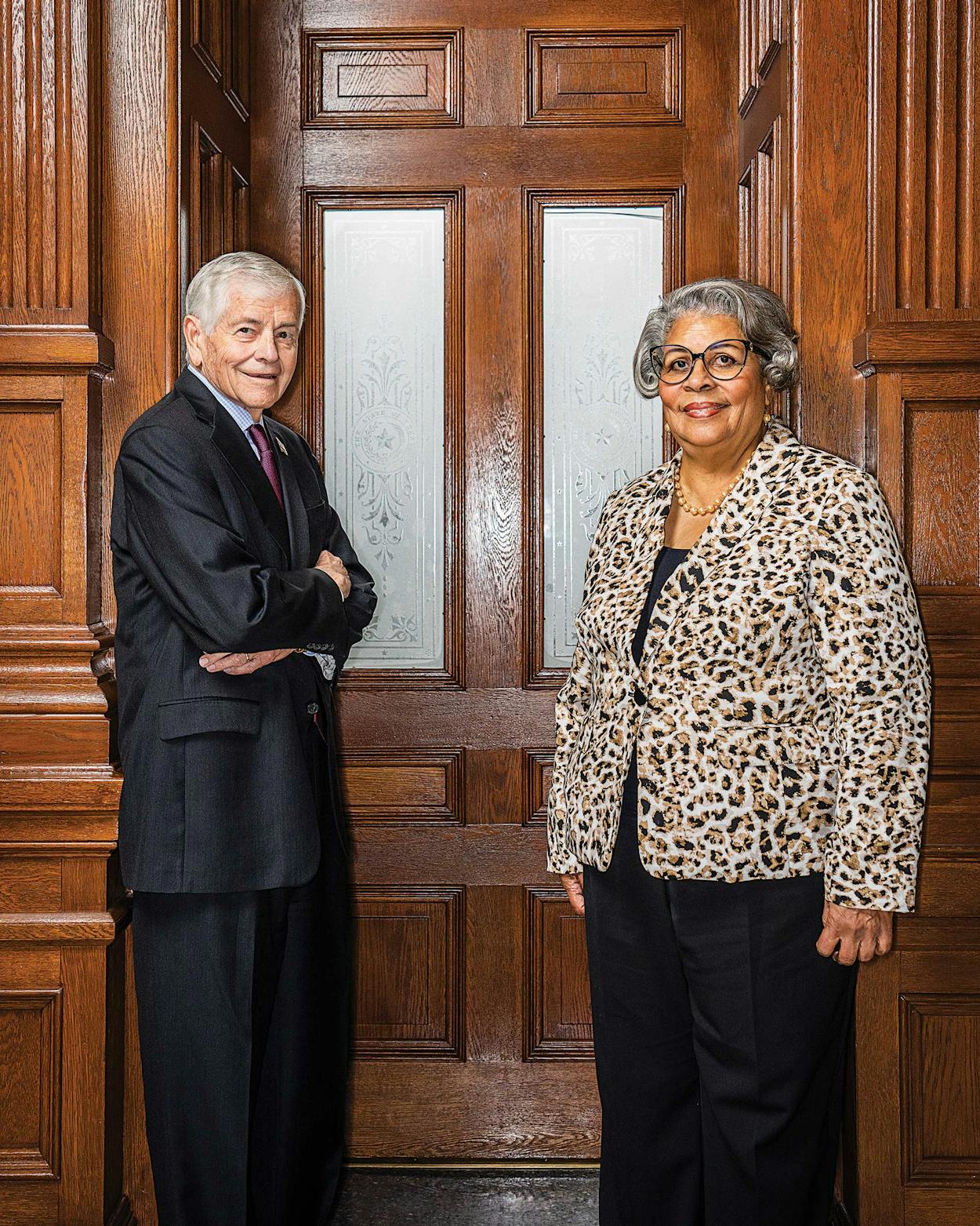In 1972 the infamous bribery scheme known as the Sharpstown scandal blew up the Texas political power structure and fueled the ascent of a couple of political upstarts—state representatives Tom Craddick, who had arrived in 1969, and Senfronia Thompson, who would arrive in 1973—to a Legislature that had been run since Reconstruction by white Anglo Democrats. Craddick, who has long worked in the oil business, was one of only nine Republicans in the Texas House; Thompson, a Democrat and a trial lawyer, was one of just five women, only two of whom were Black.
Today, Craddick is the longest-serving member of the House; Thompson is the longest-serving Democrat. They sat down with Texas Monthly to talk about what’s changed in the half century they’ve spent on the House floor and what hasn’t. In an era of increasing polarization, the two remain self-professed friends and are optimistic about the democratic process. Why? Time has tempered their expectations.
Texas Monthly: When you arrived at the Legislature, you were considered outsiders. What was that like?
Senfronia Thompson: Women were not accustomed to being in the Legislature in large numbers. Sissy Farenthold was the only woman in the House [in the legislative session before I arrived], and then four more women came at the same time as me. Before me [and Eddie Bernice Johnson], Barbara Jordan had been the only African American woman in the Legislature. When I first came, I had a list of agenda items from my district, and I was of the belief that I could get them all done in one session. I thought since I was here, I could just propose bills, and boom, boom, boom—they would pass. I had no idea that you had to really work with people to get your ideas across, and it took a lot of effort. Sometimes you didn’t get the whole idea but maybe a portion of it. So you had to make a lot of adjustments and compromises.
Tom Craddick: When I wanted to introduce a bill, I went up to the clerk, who used to sit in front of the Speaker. She looked up at the Speaker, who shook his head, and she said, “Well, you can’t introduce a bill as a Republican.” So I learned the system right there.
TM: What did you do in that situation?
Craddick: I went back, and I got to know the members like Senfronia. I was the youngest member at that point, so I got to know a lot of the younger members who were Democrats, and I got them to support the bill, which was a local bill, for my district. This was one bill I had to pass. They were involved and I took credit for passing it—in fact, it’s still hanging on the wall of my office. Eight of us lived together for three sessions. I was the only Republican, but we all became great friends.
TM: When you arrived at the Legislature, Ms. Thompson, you gave a personal privilege speech [a speech that addresses an issue unrelated to legislation] because you were disrespected.
Thompson: There was a guy in my freshman class. I didn’t know him. I go over to the [Texas Trial Lawyers Association building] for lunch. I walk in, and he says, “Oh, here comes my beautiful Black mistress.” I just went livid, because in my culture to have been called a Black mistress was like somebody calling me a slut. I was just infuriated. I had to wait six hours before I was permitted to give that speech. I told them, in essence, that I had been elected like they had and that I was going to be respected.
TM: How were you treated afterward?
Thompson: All my bills got killed. I wasn’t able to get anything done for some time. I had stepped into a man’s world to tell them I was not going to take this s— off of anybody, and that was a no-no for women to do.
TM: What earns a legislator respect on the House floor?
Thompson: Number one, you learn how to work with people. You don’t lie to them. I learned I could take a position, and if my position changed, I could go to that person and tell them. I don’t want them to be shocked when they look up on the board and see my vote is different than what I had committed to.
Craddick: The key is being honest with members. I’m a big advocate of polling—going to their desk and trying to answer their questions. I think it makes a difference when you ask people and you are truthful with them. Lemme tell you, once you lie on the floor, I don’t think you can ever redeem it.
TM: Obviously, over fifty years, you’ve encountered dishonesty. How did you handle that?
Craddick: I killed my own bill two sessions ago. Somebody messed with something in the bill that they said they wouldn’t, and I raised a point of order and killed my own bill.
Thompson: I remember we once had a bill on the floor, and a representative from Dallas had made a commitment to vote a certain way, and then he voted differently. I’m telling you, he was never able to redeem himself.
Craddick: You just can’t do it.
Thompson: A few weeks later, he had a piece of legislation on the floor, and that board looked bloodred. [Red lights indicate “no” votes.] It was not that there was anything wrong with the legislation—it was that he had misled people.
TM: That tradition may not have changed, but what’s one that has?
Craddick: When we arrived here, the chairman of the appropriations committee, Bill Heatly, kinda did the whole appropriations bill himself, over in his apartment. The committee had meetings, but they would just lay it out and say, “This is it. Take it or leave it.”

Thompson: The appropriations bill used to be passed in twenty minutes.
Craddick: That’s right. And he didn’t let you read it or see it. [After House Speaker Gus Mutscher was ousted in the wake of the Sharpstown scandal] it took over an hour, an hour and a half, and people were just astounded: “Why did this bill take so long?” We began to question everything in the bill. Today they bring out the bill and explain it section by section. There are amendments. None of that was done back when I started out.
TM: In 2003 Mr. Craddick was named Speaker, and in 2009 he was ousted and succeeded by Joe Straus. Ms. Thompson, you were among the Democrats who helped make that happen. Tell me a little bit about that.
Thompson: Tom and I had been friends for a long time, and there were several times I would get PO’d with him about stuff. I ran against him two times as Speaker. I couldn’t win—I knew that.
TM: What were you upset about?
Thompson: Maybe bills that I couldn’t get passed. I might have objected to some interpretations of House rules. But let me move back a little bit. In my other job, as a lawyer, I had an oil and gas case that I had to argue in court. I knew very little about oil and gas. And I went over to Tom and said, “I’ve got a case, and I gotta go to trial, and I don’t know anything about this.” I sat down with him, and he walked me through it. I won my case on his information.
TM: Was that before or after you ran against him as Speaker?
Thompson: That was before. He has helped me out with several things. I fall out with him; I get angry with him. But we have never lost our friendship. I think it’s the respect we have for each other.
Craddick: It is respect. She’s helped me in the last few sessions. I’ve had problems with some things, and she’s helped me—you know, held up bills in her committee. We’ve kinda had fun.
TM: Y’all are describing wonderful bipartisanship, but I’ve sensed a shift in the Texas Legislature in recent years. Is bipartisanship dead there?
Craddick: It is a lot more partisan. We have a two-party system now, and the two parties want different things. The hardest thing for me as Speaker was [Democrats who] were disrupting things on the House floor.
Thompson: I was part of the wrecking crew at times.
TM: Do either of you ever get frustrated that change is so incremental?
Craddick: You just have to have patience. I’ve proposed bills banning texting while driving four times, but we finally passed it in 2017, and it became law.
Thompson: I’ve learned persistence. I read somewhere water cannot drive a hole through a rock, but if it persistently bumps up against that rock, a little crack starts, and the crack becomes a hole, and then water can go straight through it.
TM: Did you ever think you would be here for half a century?
Craddick: It’s been a great life. It gave me the opportunity to have a business career and my kids and my family. As long as I am capable physically and think I’m effective, then I’m staying. Plus, my wife, Nadine, said if I quit, I can’t come home [laughs]. I love the House and I love being in it. I had the chance to run for Congress and Senate, and I just didn’t want to do that.
Thompson: I went to Washington, D.C., one time. I had suede boots on, and I had never walked in snow. I said, “I don’t know why anybody would want to live up here in the wintertime.” I never did think I would be here this long. Each session there is something left undone. The next session you will be able to get it done, and things get added to that list each time.
This interview has been edited for clarity and length.
This article originally appeared in the February 2023 issue of Texas Monthly with the headline “Close to the Lege.” Subscribe today.
- More About:
- Politics & Policy
- Texas Lege
- Tom Craddick







